#Giles Foster
Explore tagged Tumblr posts
Text

I believe he took this picture when he filmed Dutchgirls(1985).
James Wilby as Philip Dundine in film, Dutchgirls(1985). "A lovely thing which was written by William Boyd, " says James, in his BFI interview "The Reflection on Maurice" , 2018.
#james wilby#1985#dutchgirls#Philip Dundine#my dream lover#Giles Foster#william boyd#BFI interview#Reflection on Maurice#2018#my
23 notes
·
View notes
Text

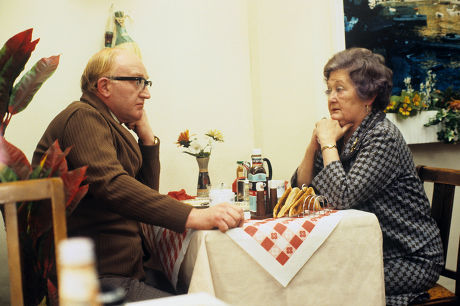


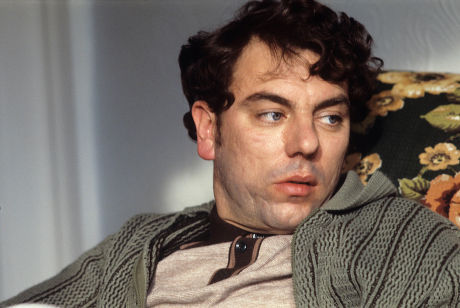
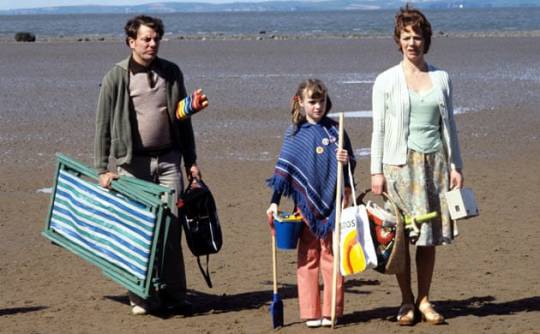
Six Plays by Alan Bennett: All Day on the Sands (1.6, LWT, 1979)
"Look at the level of that sauce. Only started yesterday, it's gone down dramatically. I'm under no compulsion to provide sauce. Lathering it on. It's not as if my cooking needed sauce!"
"Make it available on request. Sauce available on request, that'll bring them to a sense of responsibility."
"Wouldn't care, but they go at the salt and pepper like lunatics. You'd think they'd never seen a cruet in their lives."
#six plays by alan bennett#all day on the sands#alan bennett#giles foster#1979#single play#marjorie yates#alun armstrong#gary carp#susan hopkins#jane freeman#ken jones#helene palmer#lynne carol#clifford kershaw#harry markham#albert modley#rosalind wilson#jonathan coy#stephen greenwood#bert gaunt#elizabeth dawn#having pushed the envelope a little at times‚ this series ends on a safer note with a classic Bennett piece about holidaymakers and wryly#observed class and relationship inspired dialogue. it's also for my money perhaps the weakest of the six plays; it has some brilliantly#sharp lines and scenes in true Bennett fashion but the overall play is just a little... aimless. a meandering look at a family on holiday#as Alun Armstrong's father figure struggles with being newly unemployed and Marjorie Yates as his wife variously supports‚ cajoles‚ and#picks at him. at the centre are their two children‚ but particularly their son‚ whose misadventures we follow as he attempts to retrieve a#lost sandal. it's fine enough but it doesn't really go anywhere‚ and it hasn't the bite nor the impact that the others in this strand had#i think partly as well that lies with Giles Foster's direction‚ which hasn't the spark or creativity of Lindsay Anderson‚ nor the fluidity#or careful precision of Stephen Frears (who helmed 4 of the 6 plays and acted as producer). still‚ despite my griping‚ not a bad piece
2 notes
·
View notes
Text
"SILAS MARNER" (1985) Review
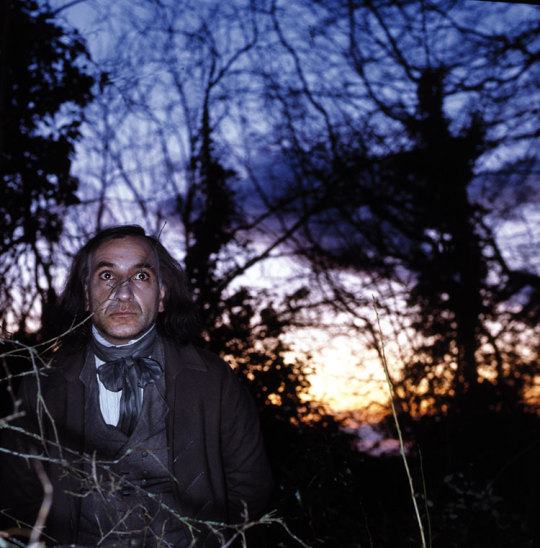
"SILAS MARNER" (1985) Review
I have seen a handful of television and movie adaptations of novels written by George Eliot. But the very first adaptation I ever saw was "SILAS MARNER", the 1985 version of Eliot's third novel published back in 1861. My recent viewing of the production led me to reassess it.
"SILAS MARNER" begins with an English weaver living with a small Calvinist congregation in Lantern Yard, a slum street in a Northern England city. His life falls apart when he is framed for stealing the church's funds, while watching over the congregation's ill deacon. Worse, his fiancee leaves him for his so-called best friend, the very man who may have framed him. Shattered and embittered, Silas leaves Lantern Yard and arrives at a rural village in the Midlands called Raveloe. Although he resumes his trade as a weaver, Silas' traumatized past leads him to achieve a reputation as a miser and a loner in the community.
Silas' move to Raveloe eventually leads him to cross paths with the community's leading citizens, the Cass family. The head of the latter is the elderly Squire Cass who has two sons - Godfrey and Dunstan. Godfrey, who is the squire's heir is secretly married to one Molly Farren, a lower-class woman and opium addict from another town, who has given birth to his young daughter. Godfrey is also engaged to a young middle-class woman named Nancy Lammeter. Dunstan is a dissolute wastrel who constantly loses money via excessive gambling. One night, a drunken Dunstan breaks into Silas' cottage, steals the gold coins that the latter has been hoarding and disappears. Through a series of events, Molly plots to expose her marriage to Godfrey and their child during the Cass family's New Year party, but dies in the snow before she can reach it. Silas, who is emotionally upset over the loss of his coins, finds both the dead Molly and the child. Although he informs the partygoers of Molly's death and the child, he assumes guardianship of the latter (renamed Hephzibah "Eppie"), much to the relief of Godfrey, who can now legally marry Nancy. All goes well until Godfrey and Nancy's failure to have children threaten Silas' newfound happiness as Eppie's father years later.
What can I say about "SILAS MARNER"? I can honestly say that it was not one of the best adaptations of a George Eliot novel. Then again, I do not consider the 1861 novel to be one of her best works. I realized that Eliot had set the story either around the end of the 18th century or around the beginning of the 19th century. It was her prerogative. But both the novel and the movie seemed to reek of Victorian melodrama that I found myself feeling that Eliot or any adaptation could have set the story around the time it was originally written and published - the mid 19th century. The story is, at best, a good old-fashioned Victorian melodrama. I would never consider it as particularly original in compare to the likes of "MIDDLEMARCH" or "DANIEL DERONDA".
"SILAS MARNER" tries its best to be profound on the same level as the other two Eliot stories I had mentioned. But I had a few problems with the narrative. What was the point behind Dunstan Cass' disappearance and theft? Yes, he stole Silas' hard earned money before he disappeared. I got the feeling that the stolen coins seemed to serve as a prelude to Silas' emotional attachment to Eppie. But why have Dunstan take it? How else did his disappearance serve the story . . . even after his dead remains were found close by, years later? In Eliot's novel, the discovery of Dunstan led brother Godfrey to form a guilty conscience over his own secret regarding young Eppie and confess to his wife. But in the movie, it was Godfrey and Nancy's inability to conceive a child that seemed to finally force the former to confess. Unless my memories have played me wrong. Frankly, Dunstan struck me as a wasted character. Anyone else could have stolen Silas' money.
I also noticed that Giles Foster, who had served as both screenwriter and director for this production, left out a few things from Eliot's novel. I have never expect a movie or television to be an accurate adaptation of its literary source. But I wish Foster had shown how Eppie's presence in Silas' life had allowed him to socially connect with Raveloe's villagers. Eliot did this by allowing her to lead him outside, beyond the confines of his cottage. The only person with whom Silas managed to connect was neighbor Dolly Winthrop, who visited his cottage to deliver him food or give advice on how to raise Eppie. I also noticed that in the movie, Silas had never apologized to another villager named Jem Rodney for his false accusation of theft. And Jem had never demanded it. How odd. I also wish that Foster could have included the segment in which Silas had revisited his former neighborhood, Lantern Yard. In the novel, Silas' visit revealed how the neighborhood had transformed into a site for a factory and its citizens scattered to other parts. Silas' visit to his old neighborhood served as a reminder of how his life had improved in Raveloe and it is a pity that audiences never saw this on their television screens.
Yes, I have a few quibbles regarding "SILAS MARNER". But if I must be really honest, I still managed to enjoy it very much. Eliot had written a very emotional and poignant tale in which a lonely and embittered man finds a new lease on life through his connection with a child. Thanks to George Eliot's pen and Giles Foster's typewriter, this story was perfectly set up by showing how Silas Marner's life fell into a social and emotional nadir, thanks to the betrayal of a "friend" and the easily manipulated emotions of his neighbors.
Once Silas moved to Raveloe, the television movie did an excellent, if not perfect, job of conveying how he re-connected with the world. It was simply not a case of Silas stumbling across a foundling and taking her in. Even though he had formed a minor friendship with Mrs. Winthrop, having Eppie in his life managed to strengthen their friendship considerably. The movie's narrative also took its time in utilizing how the Cass family dynamics played such an important role in Silas' life in Raveloe. After all, Godfrey' secret marriage to Molly Farren brought Eppie into his life. And Dunstan's theft of his funds led Silas to re-direct his attention from his missing coins to the lost Eppie. And both Godfrey and Nancy Cass proved to be a threat to Silas and Eppie's future relationship.
The production values for "SILAS MARNER" proved to be solid. But if I must be honest, I did not find any of it - the cinematography, production designs and costume designs - particularly memorable. The performances in the movie was another matter. "SILAS MARNER" featured solid performances from the likes of Rosemary Martin, Jim Broadbent (before he became famous), Nick Brimble, Frederick Treves, Donald Eccles, Rosemary Greenwood; and even Elizabeth Hoyle and Melinda White who were both charming as younger versions of Eppie Marner.
Angela Pleasence certainly gave a memorable performance as Eppie's drug addicted mother, Molly Farren. Patsy Kensit not only gave a charming performance as the adolescent Eppie, I thought she was excellent in one particular scene in which Eppie emotionally found herself torn between Silas and the Casses. Freddie Jones gave his usual competent performance as the emotional Squire Cass, father of both Godfrey and Dunstan. I was especially impressed by Jonathan Coy's portrayal of the dissolute Dunstan Cass. In fact, I was so impressed that it seemed a pity that his character was only seen in the movie's first half.
I initially found the portrayal of Nancy Lammeter Cass rather limited, thanks to Eliot's novel and Foster's screenplay. Fortunately, Nancy became more of a central character in the film's second half and Jenny Agutter did a skillful job in conveying Nancy's growing despair of her inability to have children and her desperation to adopt Eppie. I thought Patrick Ryecart gave one of the two best performances in "SILAS MARNER". He did an excellent job of conveying Godfrey Cass' moral ambiguity - his secrecy over his marriage to Molly Farren, the passive-aggressive manner in which he "took care" of Eppie through Silas and his willingness to use Eppie as a substitute for his and Nancy's failure to have children. Ryecart made it clear that Godfrey was basically a decent man . . . decent, but flawed. The other best performance in "SILAS MARNER" came from leading man Ben Kingsley, who portrayed the title character. Kingsley did a superb job of conveying Silas' emotional journey. And it was quite a journey - from the self-satisfied weaver who found himself shunned from one community, to the embittered man who stayed away from his new neighbors, to a man experiencing the joys and fears of fatherhood for the first time, and finally the loving man who had finally learned to re-connect with others.
Overall, "SILAS MARNER" is more than a solid adaptation of George Eliot's novel. I did not find its production designs particularly overwhelming. I did enjoy Eliot's narrative, along with Giles Foster's adaptation rather enjoyable . . . if not perfect. But I cannot deny that what really made this movie work for me were the first-rate performances from a cast led by the always talented Ben Kingsley. Victorian melodrama or not, I can honestly say that I have yet to grow weary of "SILAS MARNER".
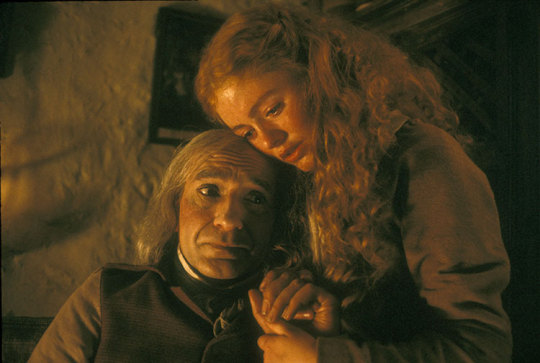
#george eliot#silas marner#silas marner 1985#ben kingsley#angela pleasence#donald eccles#freddie jones#jenny agutter#jonathan coy#jim broadbent#nick brimble#patsy kensit#patrick ryecart#giles foster#elizabeth hoyle#melinda whiting#rosemary martin#robert putt#frederick treves#rosamund greenwood#period drama#period dramas#costume drama
0 notes
Text
“Cannibal chocolates”: CONSUMING PASSIONS (Giles Foster, 1988)
Consuming Passions is a black-comedy film directed by Giles Foster (Hotel du Lac). The film is based on the stage play Secrets by two of the Monty Python greats, Michael Palin and Terry Jones, which was filmed and shown on the BBC in 1973. This is what I call entrepreneurial cannibalism, with a subgroup of accidental or fortuitous circumstances. A chocolate factory is preparing to launch a new…
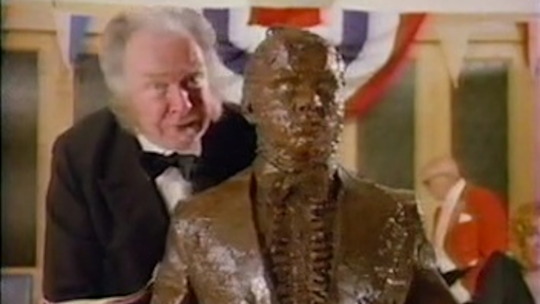
View On WordPress
#annie potts#cannibalism#capitalism#chocolate#consuming passions#entrepreneurial#giles foster#michael palin#nancy fraser#neo-liberalism#ouroboros#pigs#prunella scales#Secrets#terry jones
0 notes
Text

Say hello to Mr Giles.








Bonus kitty, my current foster kitten, Millie:

Follow for more Giles and foster kittens!
#giles the cat#cats of tumblr#tabby cat#kitty#cat#foster kittens#brown tabby#cats of the internet#kittens#millie the kitten#cat blog
141 notes
·
View notes
Text

weird white dude alignment chart
i don’t know what this trope is so for now i’m just calling it “you wouldn’t hit a guy with glasses, because he’d kill you”
#digital art#digital painting#fanart#re-animator#gargoyles#disney gargoyles#metalocalypse#buffy the vampire slayer#herbert west#owen burnett#charles offdensen#charles foster offdensen#rupert giles
103 notes
·
View notes
Text
Giles watching the kittens play. He doesn't like being jumped on but he loves to watch them do their thing.
22 notes
·
View notes
Text
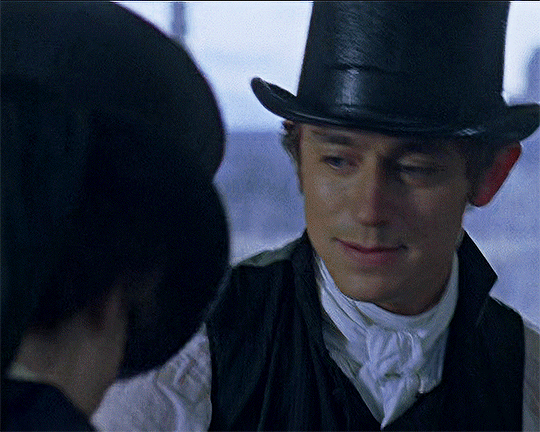

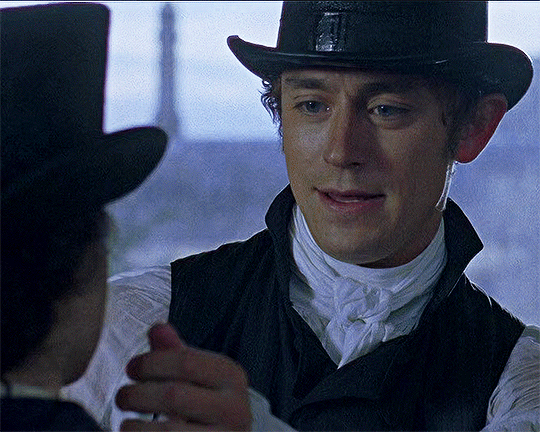
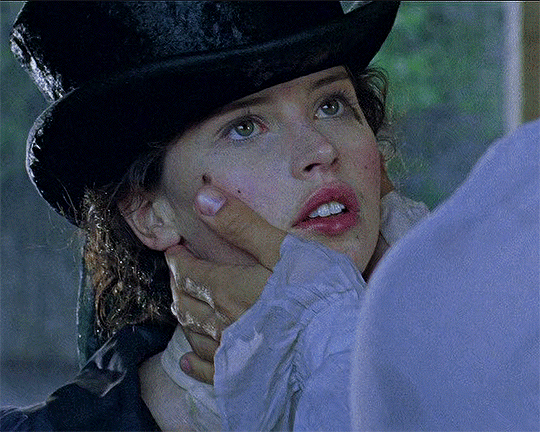
Northanger Abbey (2007) dir. Jon Jones, Giles Foster
#catherine morland#henry tilney#northanger abbey#perioddramaedit#periodedit#periodgif#filmedit#tvedit#austenedit#filmgifs#moviegifs#perioddramasource#onlyperioddramas#userbennet#catalinabaylors#tuserbea#userpavlova#userperioddrama#usermooyn#cami.gif#idk how to feel about this colouring tbh
848 notes
·
View notes
Text
I bloody love the relationship between Wesley and Giles.
This younger impressionable Watcher comes to take over and immediately sees he is absolutely out of his depth. "I myself have slain two vampires, in controlled circumstances of course."
Giles retorts with his standard subdued wit; "You won't find those here."
"vampires?"
"Controlled circumstances."
And throughout season three you can see Wesley coming to conclusions just after Giles, realising things just after Giles, and within a few episodes he's clocked it too. To the point that he keeps Giles on as secret unofficial watcher and often, increasingly, defers to his more experienced judgement.
Every time Wesley tries to reach out and impress Giles or bond with him and Giles is just older and tireder but you can see a small begrudging respect for Wesley fostering. Come the end of season four you have the two fencing. Giles, perhaps the more refined and experienced fencer takes Wesley handily while reading the paper and ignoring him. Wesley smiling the entire time, he's loving it and living for it.
They develop as two upper crust British men from different generations set against the foreground of sunny California, so modern as to make them both somewhat antique.
Basically what I'm saying is I wanted Giles to dominate that poor man. I want that twink obliterated.
23 notes
·
View notes
Text
Giles insisting he has to abandon Buffy so that she can grow up is really infuriating when you realize that he was 21 when he dropped out of college to skulk around with his Ripper gang. According to the wiki, he didn't give up his Ripper days and start his Watcher training until 1980 when he would have been 26. He didn't even choose that on his own, a friend had to encourage him, and then he had a family legacy to fall back on so he could spend some years in school preparing for his future. He wouldn't have started his proper adult life until after he graduated and he had to have been 30 by then
Buffy was 20 when she became a single mother to a teenager. They had no family support, they weren't even sure where their father was, Buffy had no paying job and no college degree. She was trying to keep Dawn out of foster care, keep a roof over their heads, and figure out how to finish college while having to save the freakin' world all the time. And this grown ass man who didn't have to become a real adult until he was 30 looked at this struggling 20 year old and said "She needs to do all of this alone, she'll never learn if she has a support system. That's not how I had to do it, but I'm different"
35 notes
·
View notes
Photo

Aethelred, Lord of the Mercians
Aethelred ruled as Lord of the Mercians from c. 881 to 911 and was a key military leader in the fight against Viking conquest and settlement in England. To defend Mercia, he allied himself to the powerful Kingdom of Wessex under the leadership of Alfred the Great (r. 871-899) and later married Alfred's daughter, Aethelflaed, to strengthen their alliance.
Today, Aethelred is primarily remembered as King Alfred's dutiful son-in-law or as the husband of the celebrated Aethelflaed, Lady of the Mercians. However, he was an important historical figure in his own right, who led Mercia during a time of intense conflict and transformation, which lay the foundations for the unification of England that would be completed in 927 by Aethelred's foster son, King Aethelstan (r. 924-939).
Historical Sources & Modern Depiction
Aethelred's life is documented in several contemporary sources. The Anglo-Saxon Chronicle, a chronicle recorded at Alfred's court in the 890s, and Bishop Asser's Life of King Alfred, a contemporary biography of Alfred, provide key but limited details on Aethelred's life, including his relationship with Alfred and his military campaigns. Additionally, several of Aethelred's land charters still exist, providing valuable records of his land and property transactions and his interactions with the Mercian clergy and nobility. We are also aided by the Fragmentary Annals of Ireland, a series of later medieval Irish chronicles. These annals provide insight into the later years of Aethelred's life, which were marked by illness and Mercia's defence against Norse-Irish Viking raids in Britain.
Interest in Aethelred has grown in recent years, primarily due to Toby Regbo's portrayal of him in the TV show The Last Kingdom (2015-2022), in which he is depicted as an incompetent and cowardly ruler who resents his wife. However, Bernard Cornwall – the author of The Saxon Stories, on which the show is based – admitted his portrayal of the Mercian leader was unfair to the real historical Aethelred. From the limited source material on Aethelred and his character, we see a courageous soldier and capable ruler who enjoyed a healthy relationship with Aethelflaed and was remembered by medieval chroniclers as a "man of distinguished excellence" and a "valorous earl" (Forester, 89 & Giles, 239).
Continue reading...
41 notes
·
View notes
Text






James Wilby as Philip Dundine in film, Dutchgirls(1985). "A lovely thing which was written by William Boyd, " says James, in his BFI interview "The Reflection on Maurice" , 2018.
26 notes
·
View notes
Text
#buffy the vampire slayer#btvs#buffy summers#willow rosenberg#tara maclay#sarah michelle gellar#xander harris#buffy reboot#faith lehane#rupert giles
13 notes
·
View notes
Text
How Pro-Life every character is: A DRDT Ranking
Hiiii, so as the resident Pro Life Eden supporter, I thought about this for awhile and as such, I decided to make a ranking of every character from "supports killing babies for fun" to "wants to save babies".
(Note, for my own opinions, I don't really judge if you do get an abortion if absolutely NEEDED but in my opinion you need a good reason to have one (like danger to your health or the baby is dying anyway) but it should be a last resort if there's no other options. If you don't have one then I'm giving you a side eye)
Note this is my opinion and if you disagree with me that's okay X3 Tell me who you think is the most pro life in the reblogs! x3
But here we go!
16. Ace Markey
I admit, this may be a bit of a bias as I really don't like this man :c It's okay if you like him but I'm afraid I think he is pro-murder. Probably wants every baby murdered too :c
15. David Chiem
Also a bias, I'm not his biggest fan, but I believe he would love abortion sadly :c. He doesn't care for the unborn, he only cares about people who got the chance to live. However he is lower than Ace as I could see him motivating people to keep their babies and not commit murder.
14. Teruko Tawaki
This physically hurts to write. I love Teruko :c But sadly I think she would want abortion to become legalized because she probably thinks no one deserves live. I think she even HAD abortions :c I really hope she sees the light soon and becomes better :c
13. Arturo Giles
This man supports eugenics. That's my headcanon. But enough said.
12. Veronika Grebenshschikova
It's Veronika. She loves dead babies. I only have her this low because I don't think she supports eugenics
11. Arei Nageishi
We know how Arei was at the start... BUT she wants to change so... perhaps there is a chance she'll become prolife?
10. Rose Lacroix
She seems nice. I think she'd probably recommend other options before abortion. Unfortunately if you were insistent on baby killing, she'd probably send you to the nearest clinic then take a nap and not feel guilt.
9. Whit Young
He doesn't give a crap about killing babies. Do what you want, he doesn't care.
8. Charles Cuevas
This man is a man of science... but like Whit I doubt he cares. Honestly you can swap these two.
7. Min Jeung
She canonically hates kids so she might approve of abortion. Sadly I think a lot of people here are pro murder, but luckily soon we'll be into the people who are pro life! I think she'd approve of baby murder, but then I also think she knows it is murder at least. So that puts her higher above everyone else. :c
6. Nico Hakobyan
They'd direct other options to you, awkwardly. They know it's murder, but they'd try and maybe tell you to think about it first before going through? But ultimately they just want to be left alone. Though they may also bring up animals don't get abortions. xP
5. Hu Jing
She's way too sweet. She would 100% provide expecting mothers with all sorts of stuff they need. If the mother doesn't want the kid, she'd take it off them so they don't need to get an abortion. Whether she raises it herself or puts it in foster care is another story, but she would be supportive of pregnant women x3
4. Levi Fontana
Doesn't want you to go down his path. Discourages abortion. He really doesn't want you to be a killer too. He knows it's a good thing to not get abortions unless necessary.
3. Eden Tobisa
Sadly my girl is not number 1 :c. But she's still on the front lines protecting babies x3
2. Xander Matthews
It's Xander. He hates injustice. He believes in rights for all, and that includes babies! He'd also help out like Hu does!
AND FOR NUMBER ONE.....
J ROSALES
Need I say anything? She hates murderers. She hates people who happily get abortions. She wants everyone to live, and that includes babies!
Hope we all agree :3 Tell me who you think is prolife if you want! X3
Oh and Monotv thinks abortion is murder but he loves it because he loves murder
#drdt#eden tobisa#danganronpa despair time#ace markey#david chiem#despair time#teruko tawaki#min jeung#xander matthews#rose lacroix#veronika grebenshchikova#arei nageishi#j rosales#whit young#charles cuevas#arturo giles#hu jing#nico hakobyan#levi fontana#monotv
16 notes
·
View notes
Text

In Baltimore City, MD: 13 y/o gentle senior found tied to a fence in freezing temperatures - BARCS, Baltimore MD
If you can offer this sweet senior a warm, loving foster home, please email [email protected]
Barktholomew- 13 y/o, altered male, 82lbs
Poor Barktholomew, at 13 years old, was found by a Good Samaritan in freezing temperatures tied to a fence. With no possible owner in sight, he was brought to our shelter for care, and although he's understandably overwhelmed, feeling lost and confused, he's been a friendly and cooperative boy with us so far.
Upon examination, our vets noted that Barktholomew is overweight, has nuclear sclerosis, moderate dental tartar, a few papilloma-type growths, suspected degenerative joint disease, and possible decreased hearing. He was started on joint supplements and fatty acids ongoing, and a full medical summary can be provided upon request.
No senior should spend their days in a shelter, and sweet Barktholomew here is of course no exception. He is currently on stray hold and will be available for rescue pick-up after 12/4.
Please let us know if your organization can help!
Thank you,
The BARCS Rescue Team
Baltimore Animal Rescue & Care Shelter (BARCS) New Address! 2490 Giles Rd, Baltimore, MD 21225 [email protected]| (410) 396-4695
Rescue pick-up hours: Monday-Friday: 10:30 a.m.-6:30 p.m. Saturday and Sunday: 8:30 a.m.-4:30 p.m
Adoption hours: Monday-Friday: 2 p.m.-6 p.m. Saturday and Sunday: 11 a.m.-4 p.m. Baltimore Animal Rescue and Care Shelter, Inc. (BARCS) | 2490 Giles Rd | Baltimore, MD 21225 US
#dog rescue maryland#dog rescue#dog rescue baltimore maryland#doglover#dog adoption maryland#cute animals#adopt a dog#pets#fostering dogs#dog#dogs#cute dog#dog lover#dogs are the best#dogs of tumblr#i love dogs
15 notes
·
View notes
Text
Black Cat Fosters
In honor of spooky season, and the fact that I’ve been fostering cats for a year now, I wanted to feature all the black voids I’ve had the honor of fostering this past year.
The Black Voids
Oliver:
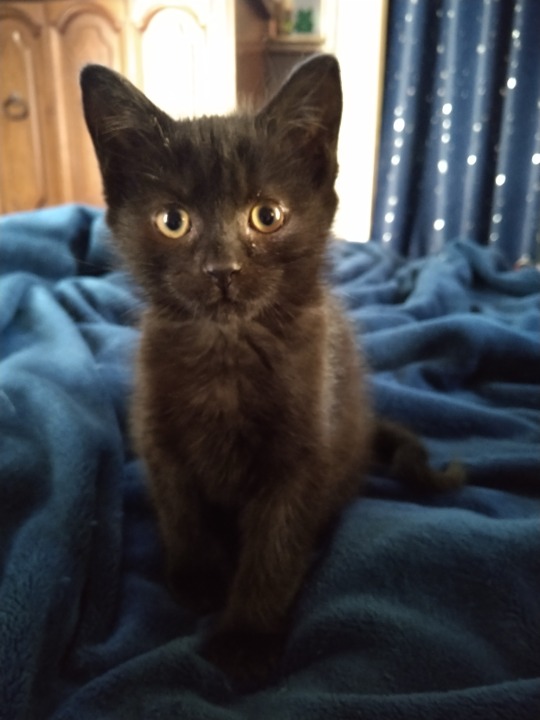
Kristina:
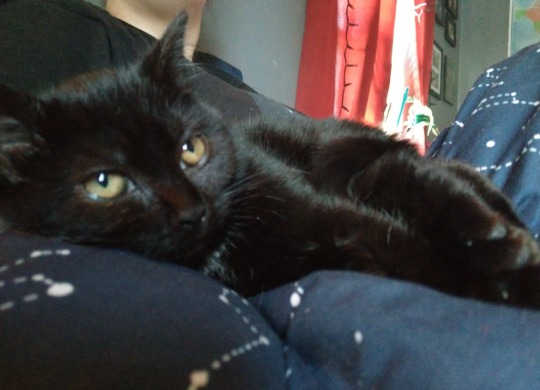
Lisa Frank:
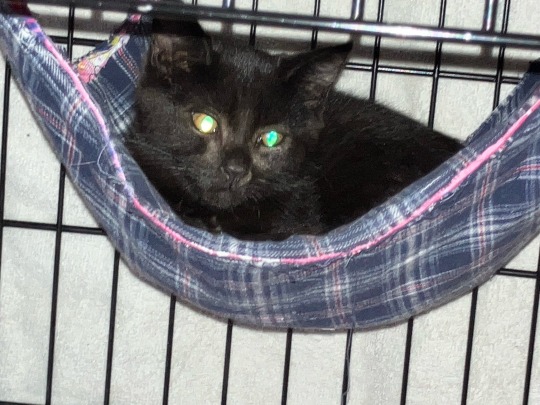
Polly Pocket:
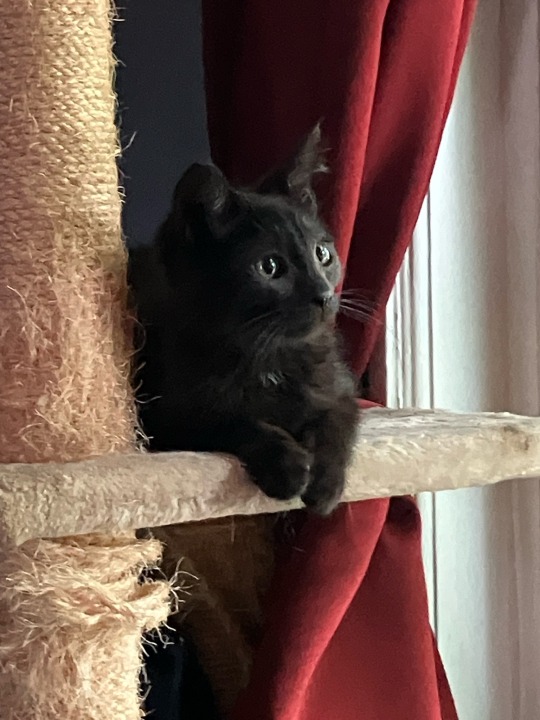
The ABCD Litter
Avery:
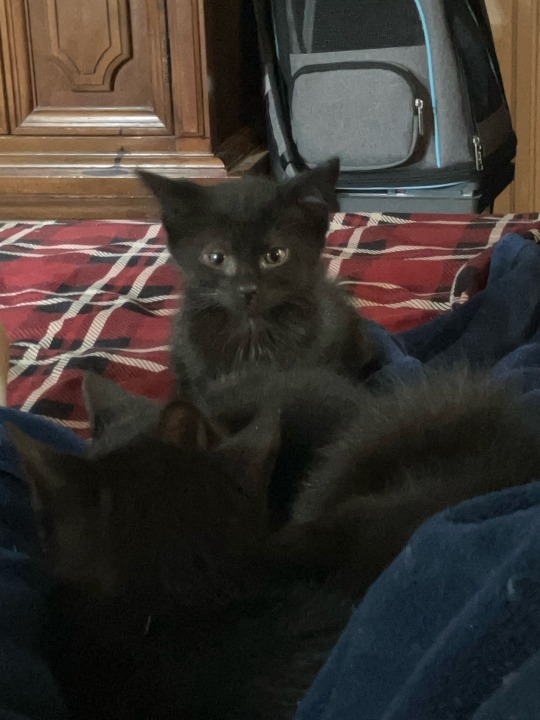
Brooke:
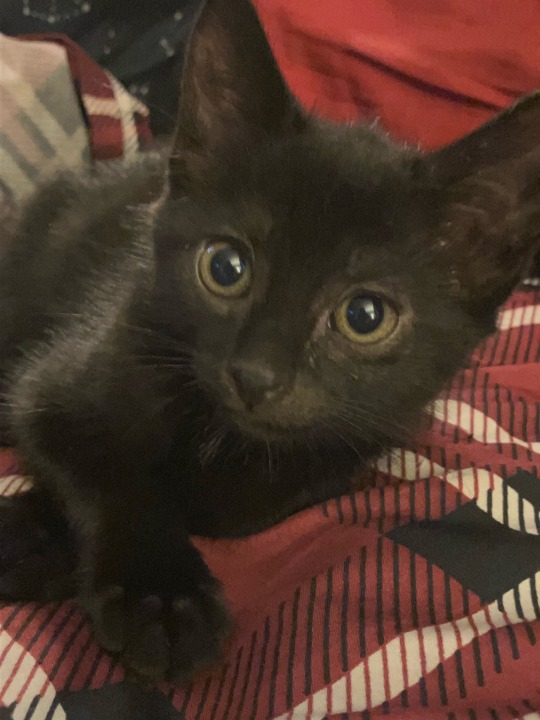
Cora:
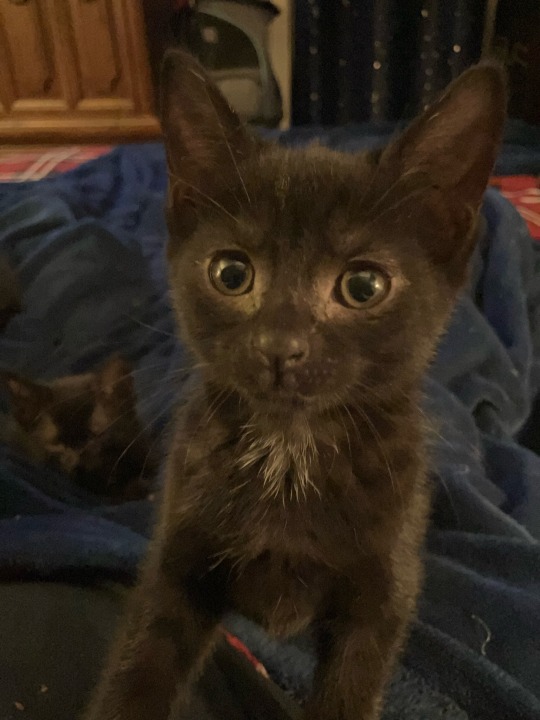
Danny:
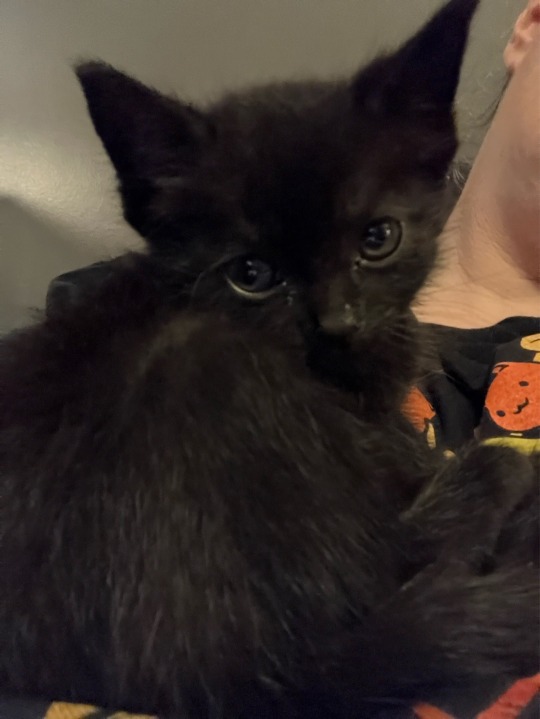
Danny Boy was the runt of the ABCD litter and originally had to be hand fed but it didn’t take long for him to be the loudest hungry boy. Took this video to show the shelter his success.
—
Lastly, the feature kitty of this blog, Mr Giles, may be a humble tabby but still wishes you all a Happy Halloween! 🎃
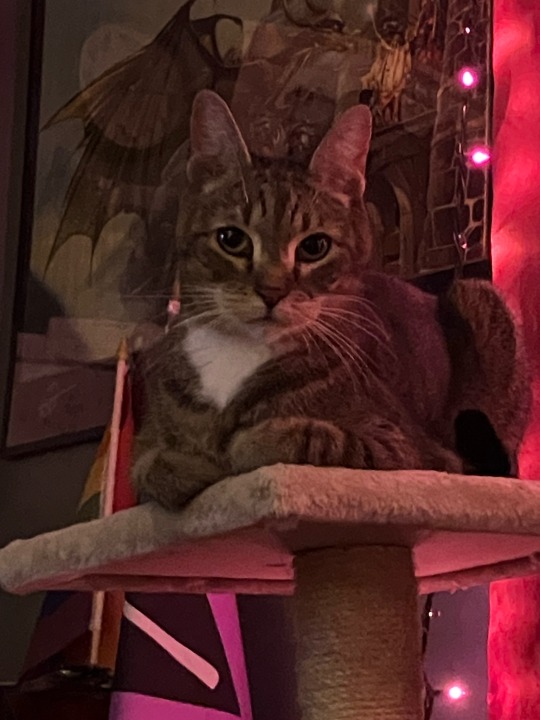
Follow for more Giles and foster kittens!
#giles the cat#kitty#cat#tabby cat#foster kittens#black cats#kittens#cats of tumblr#cats of the internet#oliver the kitten#Kristina the kitten#Lisa Frank the kitten#Polly Pocket the kitten#black voids#abcd kittens#avery the kitten#brooke the kitten#Cora the kitten#Danny Boy
122 notes
·
View notes